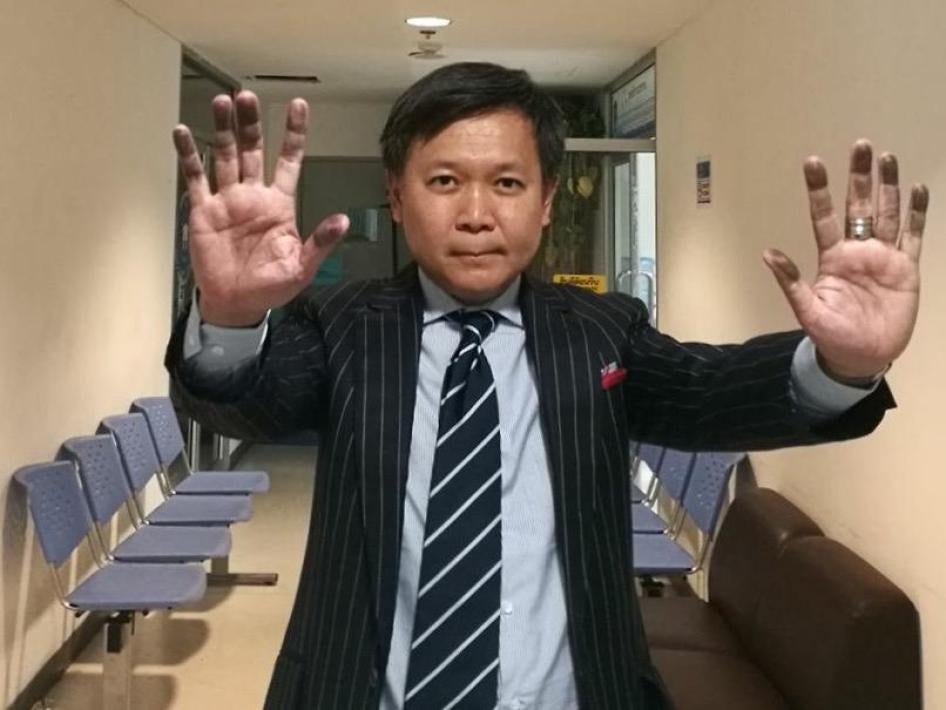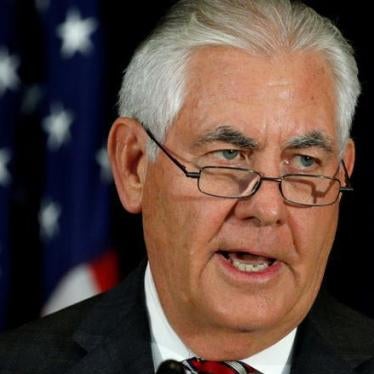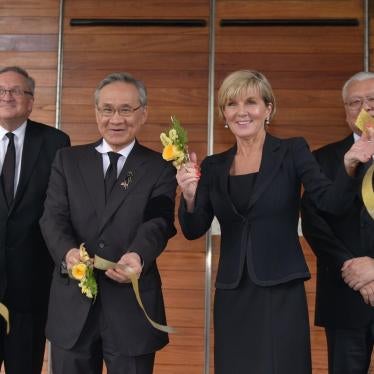(New York) – Thailand’s military government has charged a journalist and two prominent political critics with sedition and computer crimes for Facebook commentary critical of the junta, Human Rights Watch said today.
The criminal cases against Pravit Rojanaphruk, a veteran journalist at the online news website Khaosod English, Pichai Naripthaphan, former energy minister, and Watana Muangsook, former social development and human security minister, are the latest examples of the Thai government’s contempt for the rights to freedom of expression and peaceful dissent.
“The Thai junta’s dictatorial reach has expanded well beyond traditional sources to social media like Facebook,” said Brad Adams, Asia director. “These dubious charges for peaceful Facebook commentary should be dropped immediately.”
On August 8, 2017, the Police Technology Crime Suppression Division charged Pravit with sedition and computer crimes for posting comments on his Facebook page criticizing military rule and the National Council for Peace and Order (NCPO) junta’s slow response to flooding in northeastern provinces.
Last week, the police charged former government ministers Pichai and Watana with sedition and computer crime charges for their Facebook commentary about Thailand’s political and economic problems under Prime Minister Gen. Prayut Chan-ocha. Watana was also charged with sedition for using his Facebook page to express support for the deposed former prime minister Yingluck Shinawatra. Prior to these arrests, the authorities had repeatedly called all three men to military camps to undergo interrogations aimed at “adjusting their political attitude” to conform with the demands of the junta. None are currently in custody.
Sedition, which carries up to a seven-year prison sentence, is broadly defined under article 116 of Thailand’s Criminal Code as:
Whoever makes apparent to the public by words, writing or any other means anything which is not an act within the purpose of the constitution or which is not the expression of an honest opinion or criticism (a) in order to bring about a change in the laws or the government by the use of coercion or violence, (b) in order to raise confusion or disaffection amongst the people to the point of causing unrest in the kingdom, or (c) have people violate the law.
The junta regularly considers persons who repeatedly express dissenting views and opinions, or show support for the previous Yingluck government as posing a threat to national security and therefore culpable under the sedition statute.
Thailand’s Computer-Related Crime Act gives broad powers to the authorities to restrict online speech and enforce surveillance and censorship. The government considers posting critical commentary on the internet about the NCPO and the government as an offense under article 14 of the law regarding “distorted” and “false” information, with violators facing up to five years in prison.
Since the military coup in May 2014, at least 40 people have been charged with sedition. These include former education minister Chaturon Chaisaeng for a speech at the Foreign Correspondents Club of Thailand criticizing military rule; “Red Shirt” activist Sombat Boongamanong for Facebook and Twitter posts, calling people to join peaceful anti-coup rallies; activist Pansak Srithep for calling on the military to be held accountable for the 2010 political violence and to end military trials of civilians; 14 activists from the New Democracy Movement for staging a peaceful rally demanding a transition to democratic civilian rule; housewife Theerawan Charoensuk for posting photos on Facebook of her holding a plastic bowl inscribed with Thai new year greetings from former prime ministers Thaksin and Yingluck Shinawatra; human rights lawyer Sirikan Charoensiri for providing legal assistance to anti-coup activists during peaceful protests; and, “Yellow Shirt” activist Veera Somkwamkid for posting a satirical questionnaire on Facebook taunting General Prayut’s claims of achievement.
Thailand has ratified the International Covenant on Civil and Political Rights (ICCPR), which prohibits restrictions on freedom of expression on national security grounds unless they are provided by law, strictly construed, and necessary and proportionate to address a legitimate security threat. Laws that impose criminal penalties for peaceful expression are especially problematic because they have chilling effects on free speech that go well beyond the particular individuals who are charged.
The United Nations Human Rights Committee, the independent expert body that monitors compliance with the ICCPR, stated in a general comment on freedom expression that:
[T]he mere fact that forms of expression are considered to be insulting to a public figure is not sufficient to justify the imposition of penalties.… Moreover, all public figures, including those exercising the highest political authority such as heads of state and government, are legitimately subject to criticism and political opposition. Accordingly, the Committee expresses concern regarding laws on such matters as … disrespect for authority, … and the protection of the honor of public officials. [Governments] should not prohibit criticism of institutions, such as the army or the administration.
In March 2017, Thailand’s delegation told the Human Rights Committee during the review of Thailand’s compliance with the ICCPR that the government respected freedom of expression. However, the junta’s record on free expression has been poor since authorities have repeatedly harassed and prosecuted people for their speech, writings, and internet postings critical of the government.
“After more than three years in power, the Thai junta has failed to show any real commitment to reversing its abusive rights practices or protecting fundamental freedoms,” Adams said. “Governments around the world should call out Thailand for claiming to respect rights while willfully violating them.”









